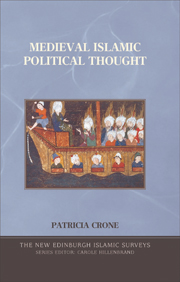Book contents
- Frontmatter
- Contents
- List of charts
- Preface
- Addenda and corrigenda
- I THE BEGINNINGS
- II THE WANING OF THE TRIBAL TRADITION, c. 700–900
- III COPING WITH A FRAGMENTED WORLD
- IV GOVERNMENT AND SOCIETY
- 17 THE NATURE OF GOVERNMENT
- 18 THE FUNCTIONS OF GOVERNMENT
- 19 VISIONS OF FREEDOM
- 20 THE SOCIAL ORDER
- 21 MUSLIMS AND NON-MUSLIMS
- 22 EPILOGUE: RELIGION, GOVERNMENT, AND SOCIETY REVISITED
- Charts
- Bibliography, abbreviations, and conventions
- Index and glossary
18 - THE FUNCTIONS OF GOVERNMENT
from IV - GOVERNMENT AND SOCIETY
Published online by Cambridge University Press: 05 August 2013
- Frontmatter
- Contents
- List of charts
- Preface
- Addenda and corrigenda
- I THE BEGINNINGS
- II THE WANING OF THE TRIBAL TRADITION, c. 700–900
- III COPING WITH A FRAGMENTED WORLD
- IV GOVERNMENT AND SOCIETY
- 17 THE NATURE OF GOVERNMENT
- 18 THE FUNCTIONS OF GOVERNMENT
- 19 VISIONS OF FREEDOM
- 20 THE SOCIAL ORDER
- 21 MUSLIMS AND NON-MUSLIMS
- 22 EPILOGUE: RELIGION, GOVERNMENT, AND SOCIETY REVISITED
- Charts
- Bibliography, abbreviations, and conventions
- Index and glossary
Summary
What services did medieval Muslims expect from the state? Religious scholars often answer the question in the form of lists of the ruler's sharī functions (i.e. those required by the Sharīa), along the lines of “the Muslims must have an imam to execute their laws, apply their ḥudūd, despatch their armies, marry off their (female) orphans and distribute the booty (fay˒) among them”. But such lists are too concise to be meaningful to a modern reader, and they do not mention any non-sharī functions, nor do they say what would happen to the sharī functions if the imam disappeared. What follows is an attempt at a fuller answer.
SHARĪ DUTIES
Validation of the community
A modern Westerner would answer the question of what government is for by starting with internal order and external defence, but medieval Muslim scholars never did, for government to them was first and foremost about the maintenance of a moral order, a law. It is with the moral order that we shall have to start as well, then.
The early Muslim community was constituted by allegiance to its imam (originally the Prophet, thereafter the caliphs). Without this leader, there was no saving vehicle in which to travel along the legal highways revealed by God: the law would not be in use; differently put, it would be suspended. If the imam was replaced with another type of ruler, the result would be the same, for whereas any kind of ruler would do for the avoidance of anarchy, only an imam would do for the avoidance of amorality.
- Type
- Chapter
- Information
- Medieval Islamic Political Thought , pp. 286 - 314Publisher: Edinburgh University PressPrint publication year: 2004

